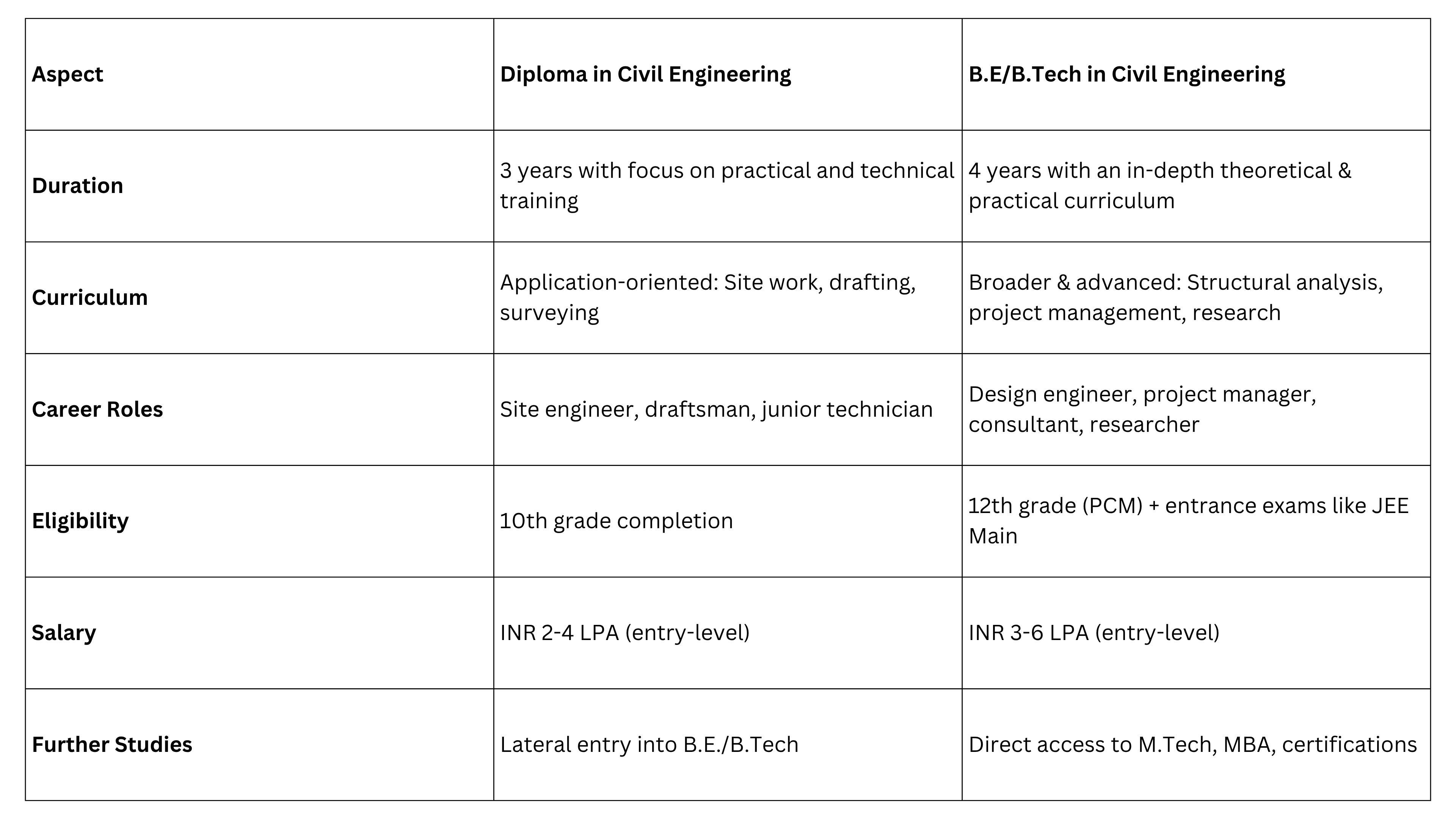
Civil engineering serves as a fundamental base that enables modern urban development and infrastructure construction throughout urban areas. The construction of vital projects such as roads, bridges, buildings, and dams in India needs personnel who can combine their technical competencies to practical, field experience. The Diploma in Civil Engineering program provides students with essential knowledge to begin their career development in civil engineering.
What is a Diploma in Civil Engineering?
A Diploma in Civil Engineering is a three-year undergraduate-level program that equips students with fundamental knowledge of civil engineering principles along with hands-on practical training. The main focus of diploma courses differs from degree programs because they teach students to apply engineering principles through practical, real-world applications. The training of diplomas produces highly desirable candidates who achieve success in construction site management and engineering firm leadership roles.
The program teaches students to start working immediately while building their skills for engineering degree programs through lateral entry admission.
Eligibility and Admission Process
The primary eligibility criterion for a Diploma in Civil Engineering is completion of the 10th standard or its equivalent from a recognised education board. Most institutions require students to have scored a minimum of 50% marks in Science and Mathematics.
The admissions process includes two separate entry pathways.
1. Merit-Based Admission: The 10th board exam results are important for entry to particular colleges.
2. Entrance Exam-Based Admission: The states and institution-based entrance exams include:
- Delhi Common Entrance Test (CET)
- Telangana Polytechnic Common Entrance Test (TS POLYCET)
- Andhra Pradesh Junior Engineering Entrance Exam (AP JEE)
- Punjab Polytechnics Entrance Test (PET)
- Odisha Diploma Entrance Test (DET)
The exams assess students' mastery of mathematics and physics content as well as their ability to apply engineering principles.
Fees Structure
The fees for diploma programs vary depending on the type of institution:
- For Government colleges the fees ranges between INR 10,000 – INR 25,000 per year, offering an affordable option.
- The total cost at private colleges ranges from INR 50,000 to INR 5,00,000 for the entire course based on the institution's reputation and available facilities.
Many colleges offer scholarships, financial aid, and installment payment plans to help students who deserve assistance with their fees.
Career Opportunities After Diploma in Civil Engineering
Both public and private sectors offer diploma holders with multiple career options. They can work with construction companies, infrastructure firms, urban local bodies, railways, and real estate developers. Popular roles include:
- Site Engineer: Supervises construction activities, ensuring quality and safety.
- Draftsman: The professional creates technical drawings and blueprints, which function as construction project documentation.
- Quantity Surveyor: This position demands two main responsibilities - cost estimation and material quantity assessment.
- Junior Engineer: Involves helping with project management work and site supervision responsibilities.
- Construction Supervisor: Manages workforce and on-site operations.
- Quality Inspector: Ensures materials and workmanship meet standards.
Many diploma holders opt to continue their education through lateral entry into B.Tech or B.E. programs, allowing direct entry into the second year of the degree.
Salary Range
The salary range for diploma holders depends on their work experience and skills, as well as the specific industry they work in.
- Entry-level: INR 2,00,000 - 4,00,000 per annum.
- Mid-level: INR 4,00,000 - INR 6,00,000.
- Senior-level: INR 8,00,000 - 12,00,000+ per annum.
Engineers who specialise in structural, geotechnical, or environmental engineering and obtain certifications and advanced skills will achieve higher earning potential.
Diploma vs. B.E. in Civil Engineering

The diploma offers a quicker, more affordable route into practical engineering roles, while B.E. provides broader career advancement and higher-level positions.
Why Civil Engineering Still Matters in the Age of AI
The present AI-based system does not replace civil engineering value because infrastructure development requires physical design work, precise material management, and human judgment capabilities. Artificial intelligence functions as a tool for civil engineers to improve their data analysis capabilities, prediction generation, and design optimisation. AI tools enable better structural stress prediction, urban planning optimisation, and project management, but human professionals maintain control for safety, feasibility, and sustainability.
The Diploma in Civil Engineering program remains valuable as it teaches students essential technical competencies which remain crucial for smart automated construction systems.
Conclusion
A Diploma in Civil Engineering in India is a practical, cost-effective pathway into the engineering field. The program teaches students to develop technical skills, practical competencies, and professional growth opportunities, which help them move up in their construction and infrastructure careers.




